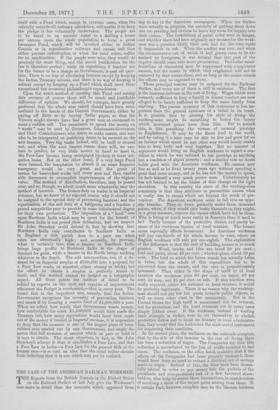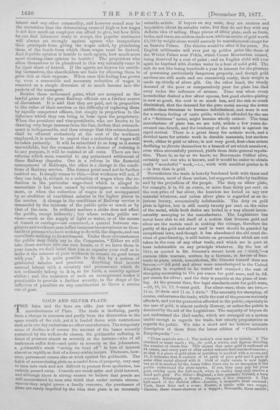THE CASE OF THE AMERICAN RAILWAY WORKMEN.
THE Reports from the British Consuls in the United States on the Railroad Strikes of last July give the Workmen's case more in detail than the accounts which appeared from
day to day in the American newspapers. When the Strikes were actually in progress, the necessity of putting them down was too pressing and obvious to leave any room for inquiry into their causes. The foundations of social order were in danger, and whether there had been originally any excuses for the work- men was a question which their acts had for the time made it impossible to ask. When the conflict was over, and when the circumstances out of which it had grown came to be ex- amined by foreigners, it was natural that this part of the inquiry should come into more prominence. Particular mani- festations of discontent may be suppressed with conspicuous success, but the causes in which they originated will not be removed by that means alone, and as long as the causes remain the effects may be expected to recur.
Three principal reasons may be assigned for the Railroad Strikes, and every one of these is still in existence. The first is the immense increase in the cost of living. Wages which were formerly sufficient to keep a family in decent comfort are now alleged to be barely sufficient to keep the same family from starving. The precise accuracy of this statement is less im- portant than the general existence of a belief in its truth. It is possible that by altering his style of living the working-man might do something to lessen the injury which increased prices have done him. But to preach this, is like preaching the virtues of oatmeal porridge to Englishmen. It may be the finest food in the world, and by eating it a man may be able to live and grow fat on an income which spent in any other way would barely enable him to keep body and soul together. But no amount of argument would bring an English workman to regard a con- dition in which he was reduced to eat porridge as anything but a condition of abject poverty ; and a similar rule no doubt holds good with the American workman. He cannot now live as well as he lived twenty years ago without spending a good deal more money, and as he has not the money to spend, he feels himself a very much poorer man. Unfortunately he has not learned to lay the blame of this change on the right
shoulders. In this country the error of the working-class commonly is that they attribute to preventible causes what is really due to causes which are beyond the reach of pre- vention. The American workmen seem to fall into an oppo- site blunder. They sit down patiently under these increased prices, when, if they would only bestir themselves, they might, in a great measure, remove the causes which have led to them. Why is living so much more costly in America than it used to be ? Partly because of the protective duties, and partly be- cause of the enormous burden of local taxation. The former cause especially affects house-rent. An American workman will pay one-fourth of his whole income in rent, where an English workman will only pay one-eighth. The explanation of the difference is that the cost of building houses is so much greater. Wood, bricks, and tiles are taxed 20 per cent. ; lead and paint, about 45 per cent. ; window-glass, about 50 per cent. The land on which the house stands has actually fallen in value, but the whole of this expenditure has to be recovered from the tenant, and the rent is proportionately increased. Then either in the shape of tariff or of local taxation the workman pays 60 per cent. on sugar, 40 per cent. on soap, and 25 per cent. on salt. If this taxation were really required, either for national or local revenue, it would be perfectly legitimate. There is no reason why the working- man should not pay his fair quota towards public objects, as well as every other class in the community. But in the United States the high tariff is maintained not for revenue, but for protection, and the local revenues are in many eases simply jobbed away. If the workmen, instead of wasting their strength in strikes, were to set themselves to abolish protective duties and to insist on honesty in local administra- tion, they would find the ballot-box the most useful instrument for improving their condition.
In the second place, the workmen on the railroads complain that by the side of this increase in the cost of living there has been a reduction of wages. The Companies say that this reduction is necessitated by the loss of traffic incident to bad times. The workmen, on the other hand, naintain that if the affairs of the Companies had been properly managed, there would have been no need to extract a dividend out of savings made in wages. Instead of this, the lines have been shame- fully jobbed in order to put money into the pockets of the presidents and vice-presidents and of a few favoured share- holders, who help to screen these transactions, in consideration of receiving a share of the unjust gains arising from them. It is certain that, however complete may be the likeness between labour and any other commodity, and however sound may be the contention that the determining cause of high or low wages is not how much an employer can afford to give, but how little he can find labourers ready to accept, the popular sentiment will always set strongly against agents who incapacitate their principals from giving the wages asked, by plundering them of the funds from which these wages must be derived. And if public opinion is hostile to such agents, how much more must working-class opinion be hostile I The proprietors who allow themselves to be plundered in this way naturally come in for their share of hatred. If the agents are knaves for enrich- ing themselves, the shareholders are fools for allowing them to grow rich at their expense. When once this feeling has grown up, even a reasonable and necessary reduction of wages is resented as a simple diversion of so much income into the pockets of the managers.
Besides these unlicensed gains, what are accepted as the lawful gains of the groat Railway officials are a further source of discontent. It is said that they are paid, not in proportion to the value of their services or the difficulty of replacing them by equally competent officers, but simply in proportion to the influence which they can bring to bear upon the proprietary. When the president and vice-presidents, who are known to be drawing very large incomes from the line, declare that retrench- ment is indispensable, and then arrange that this retrenchment shall be effected exclusively at the cost of the workmen employed, it is useless to expect that a reduction of wages will be taken patiently. It will be submitted to so long as it seems unavoidable, but the moment there is a chance of resisting it to any purpose, it will be resisted at all costs. There are two reforms which seem essential to any permanent settlement of these Railway disputes. One is a reform in the financial management of Railways, the other is a change in the condi- tions of Railway service. The former point need not be further insisted on. It simply comes to this,—that workmen will not, if they can help it, submit to a reduction of wages when the re- duction in the particular wage-fund which is alleged to necessitate it has been caused by extravagance or embezzle- ment, or when the reduction of wages is not accompanied by au abolition of exorbitant salaries in the higher places in the service. A change in the conditions of Railway service is demanded by the interests of the public quite as much as by that of the men. In ordinary matters a strike does not affect the public, except indirectly ; but where certain public ser- vices—such as the supply of light or water, or of the means of transit or carriage—are concerned, a quarrel between em- ployers and workmen may inflict immense inconvenience on thou- sands of persons who have nothing to do with the dispute, and can contribute nothing to its settlement. Under these circumstances the public may fairly say to the Companies, " Either we will take these services into our own hands, or if we leave them in your hands, we shall insist that you so organise your staff as to make it the interest of your workmen to remain on good terms with you." It is quite possible to do this by a system of graduated salaries and pensions. Anything that invests manual labour with a certainty and permanence which do not ordinarily belong to it is, so far forth, a security against. strikes ; and the existence of such an arrangement makes it practicable to provide a further security, in the shape of the infliction of penalties on any combination to throw a service out of gear.







































 Previous page
Previous page